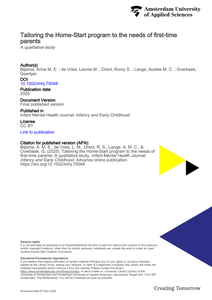Although first-time parents have a great need for effective support in the first challenging years of child upbringing, there is little research on volunteer-led parenting support programs in the context of the transition to parenthood. Therefore, this qualitative study examined the perceived value and key components of Home-Start, a volunteer-led parenting support program aimed at parents who have everyday parenting questions and receive little support from their environment, in the transition to parenthood. Semi-structured interviews were conducted among mothers (N = 10) with a first child up to 1.5 years old who were enrolled in the Home-Start program in the Netherlands, and volunteers (N = 12) who supported these parents. Important outcomes of the Home-Start program were increased positive parent-child interactions, improved parental confidence, and an expanded social network. Identified core needs of first-time mothers in the Home-Start program were social, emotional, informational, and instrumental support needs. Suggestions were provided to better align the program's structure with challenges in the transition to parenthood. For example, facilitating the parent-volunteer match during pregnancy, and developing a module in the Home-Start training for volunteers aimed at providing structured and informative support based on the latest insights into infant and postpartum care.
MULTIFILE

BackgroundHome-visiting programs often aim to improve parenting skills, parent-child relationships, and children’s developmental outcomes for at-risk families. Although research has identified what elements of these interventions are effective when provided by professionals, little is known about effective components of volunteer-based home-visiting programs.ObjectiveThis study focused on Home-Start, a preventive home-visiting program, delivering informal social support through volunteers to families with children up to 17 years old struggling with common parenting issues. The aim was to develop a detailed understanding of the core components of the Home-Start and thereby develop a better understanding of the unique elements of volunteer-based home-visiting programs.MethodsWe interviewed 10 parents and 11 volunteers and used thematic analysis.ResultsWe found evidence for the relevance of the four principles identified by Home-Start the Netherlands. These are: Needs-oriented care, Focusing on empowerment, Equality and trust, and the Gift of time. We also describe a fifth theme, namely Professional support for the volunteer. The findings suggest overlap with effective components for professional-based support, but also highlight unique elements of volunteer-based home-visiting programs, which are rooted in the shared parenting experiences of volunteers and parents.ConclusionsThis paper provides new insights into the unique value of volunteer-based support for families.
MULTIFILE

Supportive social interactions between nonparental adults (i.e. social work professionals, volunteers, and other parents that have contact with children but are not the primary caregiver), parents, and children are important for children’s well-being and development. Parenting styles, types of child behaviour, and location in the neighbourhood may influence these interactions. The aim of the present study was to identify when and how nonparental adults respond in interactions with other adults and children in the neighbourhood. A mixed-method study with vignettes and interviews (N = 114) was conducted to gain insight into which factors (parenting style, child behaviour, location in the neighbourhood) influence the nonparental adults’ intention to respond to children and/or parents. Nonparental adults indicated they were most likely to respond in the context of a permissive parenting style or a child’s externalising behaviour. Professionals more often felt responsible than parents and volunteers, although they did not respond more often. All three factors were related to the participants’ willingness to respond and promote a supportive social structure in the neighbourhood. Social work professionals and their organisations can use this study to identify social support interactions and to discuss their responsibilities.--Sociaal ondersteunende interacties tussen mede-opvoeders (zoals sociaal werk-professionals, vrijwilligers en andere ouders die contact met kinderen hebben, maar niet primair verantwoordelijk zijn) zijn belangrijk voor het welzijn en een positieve ontwikkeling van kinderen. Het doel van deze studie was inzicht geven in hoe mede-opvoeders reageren in interacties met andere opvoeders en kinderen in de buurt. Een mixed-method design met vignetten en interviews is toegepast om inzicht te krijgen in welke factoren (opvoedstijl, gedrag van een kind en locatie in de buurt) de reactie van mede-opvoeders beïnvloeden. Mede-opvoeders gaven aan dat ze het meest reageren in situaties waar sprake is van een permissieve opvoedingsstijl of externaliserend gedrag van een kind. Professionals voelen zich meer verantwoordelijk dan ouders en vrijwilligers, maar reageren niet vaker. Opvoedstijl, gedrag van het kind en locatie in de buurt hangen samen met de mate waarin respondenten reageren en om een ondersteunende sociale structuur in de buurt te bevorderen. Sociaal werkers en hun organisaties kunnen deze studie gebruiken om sociaal ondersteunende interacties te identificeren and over hun verantwoordelijkheid te discussiëren.
DOCUMENT
